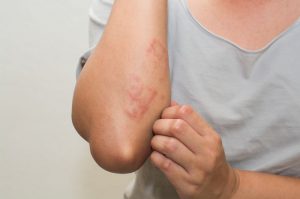
Nội dung bài viết / Table of Contents
This post is also available in: Tiếng Việt (Vietnamese)

Psoriasis is a chronic skin disorder that often comes and goes. Skin cells reproduce too rapidly and accumulate to form dry and silvery patches on the surface of the skin.
It can be mild to severe and cause extreme itchiness. Flare-ups can start with minor injury, stress, infections, exposure to col and dry climates, obesity, and other autoimmune conditions or can also occur without an obvious reason.
Psoriasis is common and usually occur in adults. It affects men and women equally. You can minimized the chance of having psoriasis by reducing your risk factors. Please discuss with your doctor for further information.
Psoriasis signs and symptoms can vary from person to person but may include the following:
Skin of the scalp, face, elbows, hands, knees, feet, chest, lower back, and folds between buttocks is usually affected. Fingernails and toenails are often involved.
Up to a quarter of people with psoriasis have symptoms of arthritis that worsen when the psoriasis becomes more severe. There may be some signs or symptoms not listed above. If you have any concerns about a symptom, please consult your doctor.
If you suspect that you may have psoriasis, see your doctor for an examination. Also, talk to your doctor if your psoriasis:
If you have any signs or symptoms listed above or have any questions, please consult with your doctor. Everyone’s body acts differently. It is always best to discuss with your doctor what is best for your situation.
The exact cause of psoriasis is unknown but is most likely caused by an autoimmune response. More specifically, one key cell is a type of white blood cell called a T lymphocyte or T cell. Normally, T cells travel throughout the body to detect and fight off foreign substances, such as viruses or bacteria. If you have psoriasis, however, the T cells attack healthy skin cells by mistake, as if to heal a wound or to fight an infection. Psoriasis is not infectious or cancerous.
Certain factors may increase your risk of developing psoriasis:
Not having risk factors does not mean you cannot get psoriasis. These factors are for reference only. You should consult your doctor for more details.
The information provided is not a substitute for any medical advice. ALWAYS consult with your doctor for more information.
The doctor can make a diagnosis from the look of the skin, nails, and scalp. The doctor may do a skin biopsy (e.g. remove a small piece of skin) for study when the diagnosis is unclear.
Psoriasis is nor curable but treatment can help control the symptoms.
You should avoid things that trigger psoriasis and using prescribed medications can control and lessen symptoms. General measures include good skin hygiene, avoiding skin injury and dryness, exposing skin to moderate sunlight, and oatmeal baths.
Treatment of mild to moderate psoriasis includes topical creams, lotions, shampoos, and ointments containing coal tar. These will reduce inflammation (redness), scaling, and itching. Steroids and other anti-inflammatory drugs applied to skin (topical) are for mild to moderate cases and as combination therapy for more severe cases.
Other treatments include salicylic acid in mineral oil (removes plaques), PUVA (psoralen and exposure to ultraviolet light A[UVA]), immunosuppressant drugs (e.g. methotrexate, isotretinoin), antihistamines (for itching) and antibiotics (for secondary bacterial infections).
Read more: Psoriasis – Symptoms and causes
What are some lifestyle changes or home remedies that can help me manage psoriasis?
The following lifestyles and home remedies might help you cope with psoriasis:
Call your doctor if:
If you have any questions, please consult with your doctor to better understand the best solution for you.
Sources: